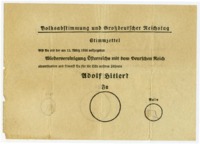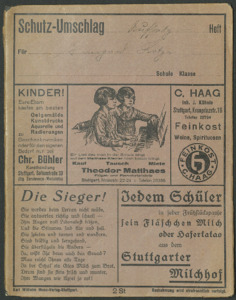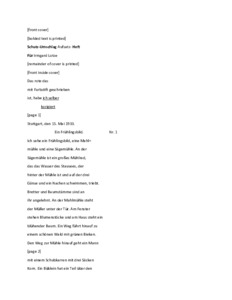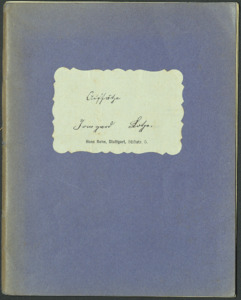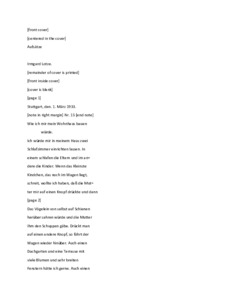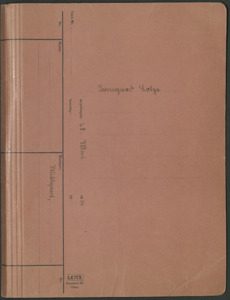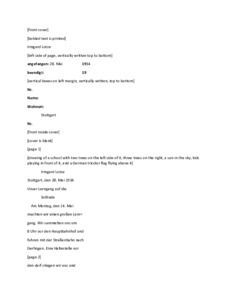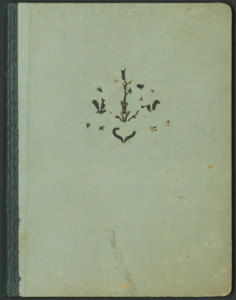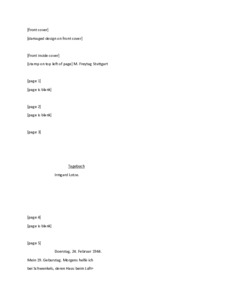
Browse Items (9 total)
Sort by:
-
Ballot from the 1938 Austrian Anschluss.
Anschluss refers to the political union of Germany and Austria, achieved through Adolf Hitler's annexation of Austria in 1938. Collected by Louis Salmon during his U.S. Army service in Austria during and after World War II, the ballot asks if the voter approves the unification of Austria with the German Reich and supports the Nazi Party ticket. It is unclear whether this ballot is an original or a later reproduction. -
Irmgard Stuhlinger School Essays, No. 1 to No. 13
Irmgard Stuhlinger was the wife of Ernst Stuhlinger, a scientist acquired in Operation Paperclip. In these school essays, she discusses her daily life in Stuttgart, Germany, as a child. When writing these essays she was 8 years old. Some of the topics include a letter to family members, Christmas, descriptions of the weather, and talking about field trips. -
Transcript of Irmgard Stuhlinger School Essays, No. 1 to No. 13
Irmgard Stuhlinger was the wife of Ernst Stuhlinger, a scientist acquired in Operation Paperclip. In these school essays, she discusses her daily life in Stuttgart, Germany, as a child. When writing these essays she was 8 years old. Some of the topics include a letter to family members, Christmas, descriptions of the weather, and talking about field trips. -
Irmgard Stuhlinger School Essays, from No. 15
Irmgard Stuhlinger was the wife of Ernst Stuhlinger, a scientist acquired in Operation Paperclip. In these school essays, she discusses her daily life in Stuttgart, Germany, as a child. When writing these essays she was 8-9 years old. Some of the topics include letters to family members, a fictional story, Christmas, descriptions of the weather, and talking about field trips. -
Transcript of Irmgard Stuhlinger School Essays, from No. 15
Irmgard Stuhlinger was the wife of Ernst Stuhlinger, a scientist acquired in Operation Paperclip. In these school essays, she discusses her daily life in Stuttgart, Germany, as a child. When writing these essays she was 8-9 years old. Some of the topics include letters to family members, a fictional story, Christmas, descriptions of the weather, and talking about field trips. -
Irmgard Stuhlinger School Essays, 1934-1935
Irmgard Stuhlinger was the wife of Ernst Stuhlinger, a scientist acquired in Operation Paperclip. In these school essays, she discusses her daily life in Stuttgart, Germany, as a child. When writing these essays she was 9-10 years old. Topics of the essays include family life, a fictional moral story, descriptions of the weather, as well as significant historic events such as the Saarabstimmung (1935 Saar status referendum). Furthermore, she mentions Adolf Hitler (German chancellor) and the Sturmabteilung (Paramilitary organization run by Nazi Germany) in these essays. In this collection, she includes an illustration with each essay. -
Transcript of Irmgard Stuhlinger School Essays, 1934-1935
Irmgard Stuhlinger was the wife of Ernst Stuhlinger, a scientist acquired in Operation Paperclip. In these school essays, she discusses her daily life in Stuttgart, Germany, as a child. When writing these essays she was 9-10 years old. Topics of the essays include family life, a fictional moral story, descriptions of the weather, as well as significant historic events such as the Saarabstimmung (1935 Saar status referendum). Furthermore, she mentions Adolf Hitler (German chancellor) and the Sturmabteilung (Paramilitary organization run by Nazi Germany) in these essays. The transcript includes a description of each illustration. -
Irmgard Stuhlinger 1944-1945 Journal
Irmgard Stuhlinger was the wife of Ernst Stuhlinger, a scientist acquired in Operation Paperclip. In this journal she details her daily life starting from her 19th birthday under the rule of the Third Reich, toward the end of the second World War. She touches on topics such as war, post-secondary education, death of family members, the acquisition of housing, and holidays in the latter part of the war. -
Transcript of Irmgard Stuhlinger 1944-1945 Journal
Irmgard Stuhlinger was the wife of Ernst Stuhlinger, a scientist acquired in Operation Paperclip. In this journal she details her daily life starting from her 19th birthday under the rule of the Third Reich, toward the end of the second World War. She touches on topics such as war, post-secondary education, death of family members, the acquisition of housing, and holidays in the latter part of the war.
